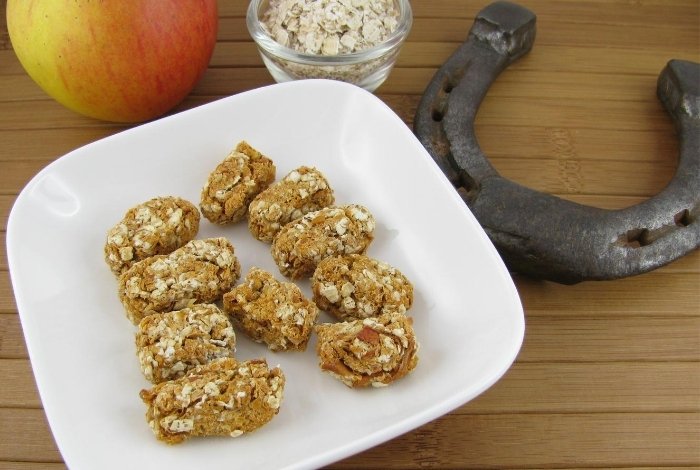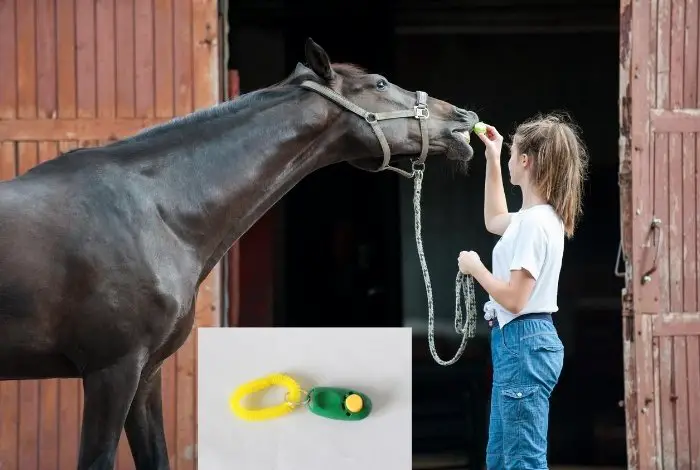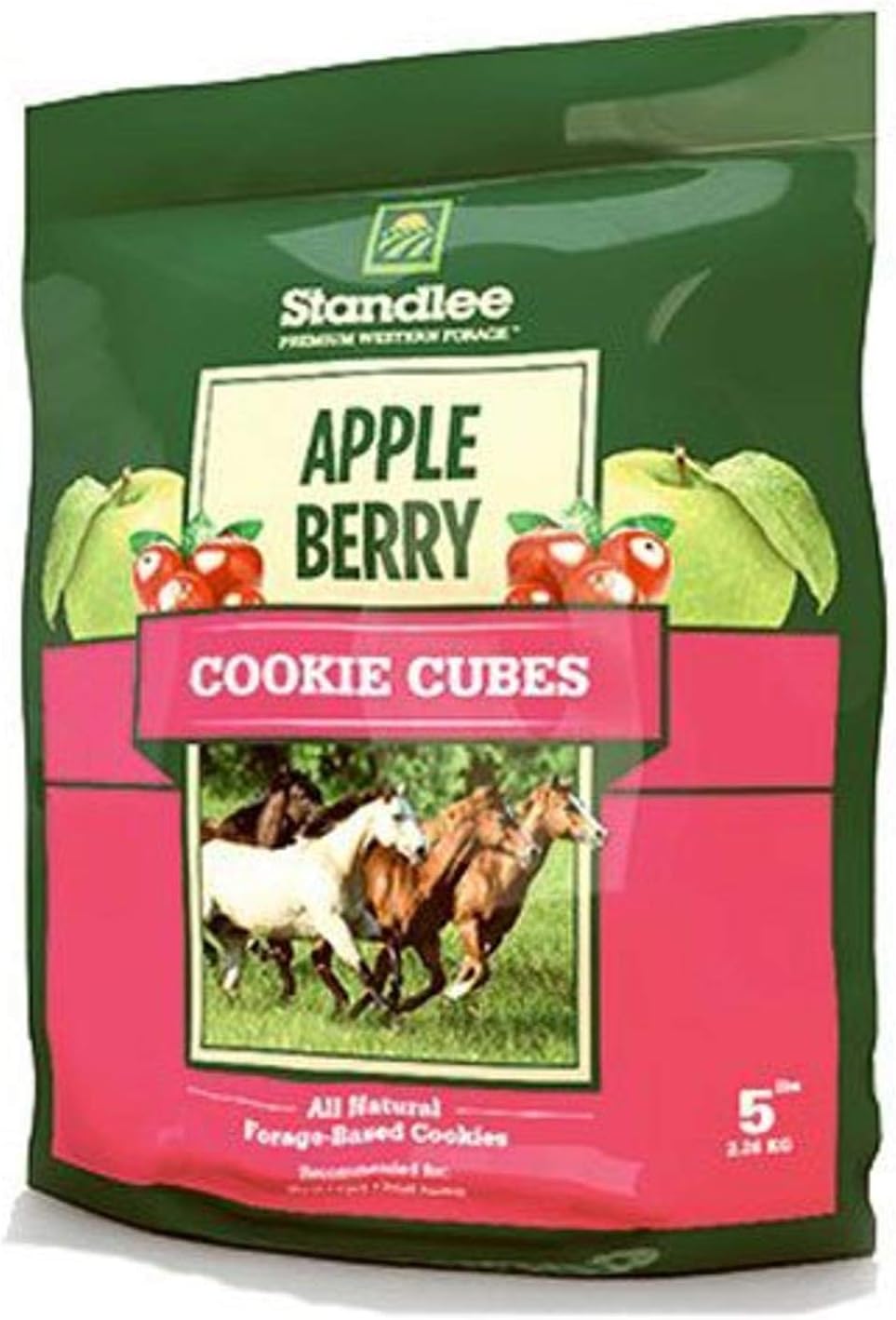Last Updated on January 22, 2022
It is well-known that horses can be incredibly food-motivated, so having some of the best treats for horses readily available is indispensable for rewarding good behavior. One of my mares is super smart, which can cause problems for me, but she’ll do pretty much anything for a treat! Horses have been proven to prefer a delicious snack over verbal praise, so if your “good boy!” isn’t cutting it, you might want to try some bribery. A lot of people immediately grab for some peppermints, or slice up some apples and carrots, but what if you’re looking for something a bit more convenient or safer? Not sure what the best treat for horses is? We’ve got you covered! Read on to see a list of the top 5 best treats for horses that you can keep on hand.To Treat or Not to Treat?
Virtual every single horse owner admits to feeding treats to their horse, which is totally understandable. People love spoiling their equine partners almost as much as the horses enjoy being fed. In addition, a lot of training techniques use small food rewards, including clicker-training. You can also use treats to encourage a horse to tolerate something that is unpleasant or uncomfortable – like vaccines or clipping. Before you run out and shower your horse cookies and cupcakes make sure you’re treating mindfully! There are risks that come with giving horses treats. Some horses can become pushy or even aggressive when they want food and haven’t been taught correct boundaries. Nobody likes a horse that nips at their hands or tries to pick their pockets! Others have dietary restrictions and may not be able to eat certain treats.
Even though you’re only (hopefully) giving them a small amount, it is a part of their diet and should be taken into account. Horses that may need to proceed with caution include those prone to laminitis, those with insulin resistance or equine metabolic syndrome, or ones that are obese. Even so, there are treats available on the market for horses with unique needs.
There are risks that come with giving horses treats. Some horses can become pushy or even aggressive when they want food and haven’t been taught correct boundaries. Nobody likes a horse that nips at their hands or tries to pick their pockets! Others have dietary restrictions and may not be able to eat certain treats.
Even though you’re only (hopefully) giving them a small amount, it is a part of their diet and should be taken into account. Horses that may need to proceed with caution include those prone to laminitis, those with insulin resistance or equine metabolic syndrome, or ones that are obese. Even so, there are treats available on the market for horses with unique needs.
How To Give Horse Treats
Treats are often given by hand and the first thing people learn is to offer the treat in the middle of your flat hand to keep fingers out of the danger zone. It’s best to move your hand toward the horse’s mouth and avoid pulling your hand back because that just encourages the horse to lunge and grab. You should also avoid giving the horse treats on a strict schedule or TOO consistently after certain events. The anticipation of a food reward can sometimes lead to poor behavior if the handler doesn’t react appropriately. Many people and facilities prefer if treats are given in the horse’s bucket instead of by hand. This avoids behavioral problems when treats are given incorrectly and reduces the chance of bites and nips.What About Clicker Training?
I’m not going to get too much into clicker training because you could fill a book with information (literally – there are great books on this subject.) Clicker training uses food rewards to condition a horse to respond to the sound of the clicker. When you get started with clicker training you generally start with learning safe methods of giving your horse treats and how to avoid inadvertently causing pushiness and other behavioral issues.
Treats for Horses Nutritional Risks
Even the best treats for horses can have nutritional risks, but these risks are generally directed at owners of horses with medical conditions. If your horse has insulin resistance you’ll want to avoid starchy or sugary snacks, because that could potentially lead to laminitis. You can find commercial treats that are low sugar/ low starch, but most use cereal grains as a base. Cereal grains, such as corn, oats, or wheat) can cause insulin spikes and are dangerous for certain horses. If your horse is HYPP positive you’ll want to avoid any treats with a higher level of potassium (I’m looking at you bananas!) A secret risky ingredient is pumpkin, because it’s generally considered healthy and safe, but does have a lot of potassium. Finally, senior horses need to be treated carefully. They often have poor teeth or difficulty with hard treats, so you may need to soak or break apart certain foods to prevent choke.How Much is Too Much?
Sometimes it can be difficult to determine if you’ve been feeding too many treats. Horses are large animals, after all, and can probably eat quite a few before there’s a problem right? Treats are not part of a horse’s balanced diet and definitely aren’t safe to feed in bulk. Many treats have a lot of added sugar and flavor to make them desirable, but that makes them dangerous in large amounts. Since horses are supposed to basically eat non-stop they’ll always be ready for another treat. Just because your horse wants one doesn’t mean you should fork it over. Many commercial treats will give a recommended number, particularly if they have added vitamins or supplements, but the rule of thumb is generally “a couple.” Obviously, this will depend on the size and ingredients, but if you’re measuring treats with a measuring cup you’re doing it wrong. Read more about Best Slow Feeders for HorsesAlternatives to Horse Treats?
If you think you’re feeding too much or are worried about your horse’s health, but you still want to reward them for a job well done, there are alternatives. Since horses find eating to be so enjoyable, you can try hand grazing them. You can also offer them a handful of hay, or some hay cubes or pellets, however, the later may need to be soaked. Just keep in mind that the act of eating is a reward, so their normal diet might be super effective!The Top Five Best Treats for Horses
1. Manna Pro Bite-Size Nuggets
Manna Pro makes these great little bite-sized nuggets and the top two flavors are apple and peppermint. The smaller size is great for training because you don’t have to try and break a large treat into pieces. Horses seem to absolutely love them and the bag lasts for a long time. The only real complaints have been that they’re tiny, so they’re easy to drop in the grass and can be hard for your horse to grab.| Pros | Cons |
|---|---|
| – Cheap | – Easy to drop |
| – Horses love them | |
| – Small |
2. Mrs. Pasture’s Cookies for Horses
Mrs. Pasture’s Cookies are a gold standard in the horse treat world. They have all-natural ingredients, don’t crumble to dust in your pockets, and are made in the USA! They are more expensive than some of the other treats, but they are definitely more natural and carefully made.| Pros | Cons |
|---|---|
| – Horses absolutely love them | – A little more pricey |
| – Doesn’t crumble and isn’t sticky |

3. The German Horse Muffin- Treats for horses
The German Horse Muffin is probably one of the best treats out there. They’re big, soft, and absolutely delicious! One of the advantages of having a bag of these around is that you can actually hide pills in them! They’re so rich and decadent with all that molasses that I’m not sure there’s a horse alive that won’t bend over backward to get one. The only “problem” is the cost, but you really get what you pay for. These are luxurious and priced accordingly.| Pros | Cons |
|---|---|
| – Insanely tasty | – Pricey |
| – Soft | |
| – Can be used to hide pills | |
| – Large (but easy to break apart) |

4. Standlee Hay Company Apple Berry Cookie Cubes
These are super cool treats because they’re alfalfa and timothy hay-based! You can break them up fairly easily for training sessions and they’re low carb for those horses with dietary restrictions! If you have a horse with insulin resistance, or you are trying to stick to a lower-carb diet for your fat pony, these are the perfect option. Despite being “just” hay-based horses still find them scrumptious.| Pros | Cons |
|---|---|
| – Hay-based | – Crumbly, often leaves you with a bunch of powder at the bottom of the bag |
| – Low carb | – Large pieces can be a choking hazard if not broken apart |
| – Still delicious |

5. Purina Apple & Oat Flavored Horse Treats
You can probably find these at any feed store and there’s a good reason! They’re a pretty standard “horse treat” and horses seem to enjoy them. They’re a great size and shape, so they’re a little easier to hand feed. And did I mention they’re cheap? If your horse likes the apple and oat flavor there are other options! There are carrot and oat and “Nicker Makers” along with Berry Good flavored senior horse treats.| Pros | Cons |
|---|---|
| – Cheap | – Too large for clicker training |
| – Tasty | – Not easy to break apart |
| – Nice size and shape |

So Which Is the #1 Top Treat For Horses?
If you’re looking for a good general treat for your horse or one that will turn them into putty in your hands, the best choice is the German Horse Muffins! They are universally loved, you can use them for medications, and they can be fed whole as a fun treat or broken apart into smaller chunks for training sessions! While they might not be the best choice for horses with a condition like insulin resistance, they’re soft enough to be chewed by senior horses and are large enough to be easily given by hand if you chose to. As long as you use every interaction with your horse as a training session the German Horse Muffins should make a great tool to keep on hand. Hopefully, this article has helped you chose the best treats for your horse! If it did we’d love it if you shared which one worked for you!FAQs
Is it OK to feed horses apples?
Apples are a good source of fiber and vitamins and yes, you can offer your horse some apples, but you need to know that there are some risks associated with feeding fruits to your horse.
The main problem is that apples are high in fructose and contain large amounts of pectin, which can cause diarrhea. If your horse has a sensitivity to apples, the risk is greater, since the apples will be more likely to cause diarrhea.
Also, too many apples in one meal can cause colic in your horse. If your horse has already had colic in the past, you should be even more careful when giving any kind of fruit to your horse. As a general rule - it's better to avoid giving your horse more than two pieces of fruit per day to avoid possible complications.
What foods are bad for horses?
Chocolate is toxic to horses because theobromine is an alkaloid found in chocolate that can cause muscle tremors and diarrhea. Persimmons and avocados contain tannins that can cause colic or gastric upset. Lawn clippings can contain high levels of certain chemicals that may cause skin irritations. Fruit with pips and stones can cause internal blockages in the intestines. Bread can have high levels of gluten, a protein that may cause digestive problems. Potatoes and other nightshades can contain solanine which can cause vomiting and diarrhea.
How many treats can a horse have a day?
Undeniably, the amount of treats that are allowed in one day is going to be determined by the size and energy level of the horse. The more energy a horse has, the more treats they can eat in one day. However, for the average horse, a treat or two per day is enough.
If you feed treats every day, you will find that your horse's behavior improves. If you want to give your horse a special treat, you can make it yourself with a homemade recipe. You can make it in a variety of flavors and include different ingredients like sugar, honey, oats, carrots, etc. You can also use the treats as a reward for good behavior. This will help you and your horse bond together.
What do horses love the most?
Horses love to eat apples, carrots, and other veggies. Their favorite treats are usually sweet fruits and candies. Some of their favorites include watermelon, apples, strawberries, bananas, and peppermints. But because of their complex digestive system, horses have to eat a certain amount of forage, while sweet treats can only be used in small quantities and as a training aid.
What are the best horse treats?
There are many. In fact, you can find a treat for every horse and every temperament. Some treats work well for certain horses, but not at all for others. And some treats work better for one temperament than another.
Safe horse treats include: raisins, sugar cubes. pitted dates, hay cubes, apple pieces, carrot pieces, sunflower seeds (with or without shells).
Michael Dehaan is a passionate horse owner, horse rider, and lover of all things equine. He has been around horses since he was a child, and has grown to become an expert in the field. He has owned and ridden a variety of horses of different breeds, and has trained many to compete in shows and competitions. He is an experienced horseman, having worked with and competed many horses, including his own. He is an active member of the equestrian community, participating in events and teaching riding lessons.


